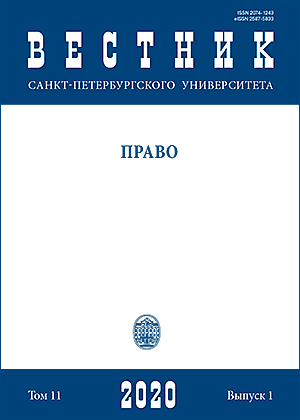Features of law enforcement in the conditions of digitalization of social relations
DOI:
https://doi.org/10.21638/spbu14.2020.103Abstract
The aim of the research is to analyze the impact of modern digital technologies on the application of legal norms. In the article the question of the influence of modern digital technologies on law enforcement is considered from the standpoint of modern post-non-classical methodology, first of all, constructivism and anthropocentrism as directions of sociological jurisprudence. Law enforcement activity is investigated as part of the mechanism for the reproduction of law as an important element of the construction of social reality. It is shown that the subject of law enforcement activity, actions that are determined by many factors including legal consciousness, plays a determining role in law enforcement. Digitalization affects the individual and collective legal consciousness of the subjects of law enforcement, thereby affecting the nature and results of law enforcement activities. Digital reality also affects the existing system of values in society, which also inevitably affects law enforcement. The article also examines the impact of digital technologies on existing law enforcement procedures and on legal techniques. A significant change in these parameters is predicted due to the prospective emergence of digital law as a new, more flexible form of law. The digital law will become an interactive legal act, which has the ability to adjust to the requests of the subjects in specific legal relations. It will radically change the idea of legal technology, as it will be created with the help of digital crowdsourcing. At the same time, the application of the norms of digital law carries certain risks, which are also investigated in the article. Another important area of influence of digital technologies on law enforcement is associated with the automation and algorithmization of the legal sphere, as the introduction of digital technologies in the law enforcement process involves the use of robots and artificial intelligence. In this regard, the problems and risks of algorithmization of law and providing robots elements of legal personality are analyzed. The article concludes that modern digital technologies in general can change the importance of law in the system of regulators of public relations, and reduce the role of legal regulation and, as a consequence, the importance of law enforcement.
Keywords:
law enforcement, digitalization, digital technologies, subject of law, legal consciousness, construction of social reality, blockchain, digital law
Downloads
References
Downloads
Published
How to Cite
Issue
Section
License
Articles of "Vestnik of Saint Petersburg University. Law" are open access distributed under the terms of the License Agreement with Saint Petersburg State University, which permits to the authors unrestricted distribution and self-archiving free of charge.






